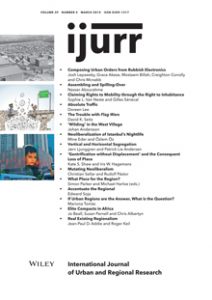This article draws attention to the emergent modes of urban sociality and circumscribed mobility that define the lives of traffic-stricken residents in the megacity of Jakarta, Indonesia. I argue that Jakarta traffic has exceeded the scale and discourse of a technopolitical problem of failed infrastructure; rather, the systemic and rhizomic nature of traffic provides the temporal infrastructure that governs the flow of living and leisure, and the patterning of individual desires and struggles in urban Indonesia. I use the term ‘absolute traffic’ to convey the limit horizon of gridlock as a set of exhausting physical and psychic states that urban residents survive daily. Despite such overwhelming challenges to mobility, particularly for the city’s underprivileged populations, I argue for an agentive perspective of absolute traffic in which forms of play, negotiation and disruption form important moments for the public display of infrastructural aptitude. Strategies for surviving and engaging with absolute traffic emerge in ephemeral sites of finely attuned traffic subjectivity––in the sociality of strangers, the political demonstrations of activists, the growing citizen journalism for traffic reports on radio shows and social media sites, and finally, in the artistic sensibility of artists captivated by the vernacular forms of urban chaos.
This article was awarded the 2015 Best Article Prize.

